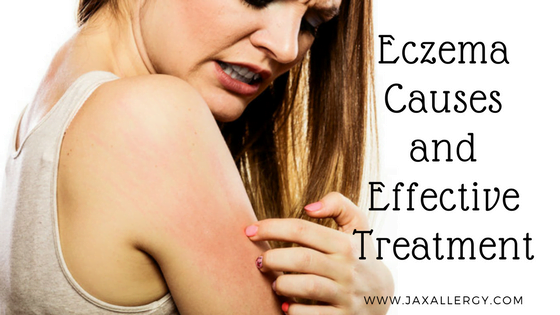What Exactly Is Eczema and How Can it be Treated Effectively?

Have you ever noticed red, itchy patches on your face, inner elbows, hands, or behind your knees? If you scratched it, the red patches likely became even more irritated and inflamed. Or maybe you’ve noticed red, inflamed patches on your child’s cheeks, chin or chest.
Eczema is a common skin condition for both children and adults. Learn more about why eczema occurs and how to find relief.
What Exactly is Eczema?
Eczema is a name which encompasses a group of skin conditions known to cause redness, itching, and inflammation of the skin. It is derived from the Greek word meaning, “to boil over.”
This is a good description of the red, itchy, inflamed patches of skin visible during flare-ups. Eczema comes in several different types and symptoms can range from mild, moderate, to severe.
The most common types of eczema include:
- Atopic Eczema
- Contact Dermatitis
- Xerotic Eczema
- Seborrheic Dermatitis
Eczema is a common condition, and in most cases, is manageable. Babies or children most often develop eczema on their face, but it can appear anywhere on the body. Symptoms typically go away as a child grows older, though some children experience eczema symptoms into adulthood. Symptoms can also occur in adulthood without ever showing signs in childhood.
What Causes Eczema?
While the exact cause of eczema is unknown, researchers believe a combination of environmental factors and genetics may be involved.
Eczema triggers can be different for everyone. You or your child may experience triggers or worsening symptoms during certain times of the year or in certain situations. Common triggers include:
- Dry skin: If your skin becomes too dry, it can become scaly, rough, or tight.
- Irritants: Everyday products may cause your skin to itch and burn. This may include soaps, shampoo, detergent, body wash, cleansers, fragrances, disinfectants, and metals. Even natural liquids such as fresh fruit juice, vegetables, or meats could irritate your skin.
- Allergens: These are materials in the environment that cause someone with an allergy to experience an allergic reaction or eczema flare up. Common allergen triggers include mold, pollen, dust mites, dandruff, and pet dander.
- Climate and sweating: Eczema isn’t limited to cold, dry climates. For some people, their eczema flares up when they exercise or wear too many layers to bed. Flare-ups can occur in both dry and humid climates.
- Stress: Emotional stress can cause eczema flare-ups for some, but the exact reason for this is unknown.
How Do You Treat Eczema?
Due to the many types of eczema and triggers which can differ from person to person, what works for one person may not work for another. It’s best to consult with your doctor before trying new treatments as some changes to your daily routine could cause worsening symptoms.
Daily Routines & Natural Methods
Perhaps the single best way to keep eczema flare-ups from occurring is establishing a daily skincare and moisturizing routine. In many cases, these preventive measures can safely treat eczema symptoms.
Cool-to-lukewarm baths or showers and aggressive moisturizing play an important role in treating eczema. Avoid taking hot showers or baths as the hot water can cause further skin irritation. Use mild, fragrance-free soaps to wash your skin, being careful to avoid soaps or cleanser which strip natural oils, resulting in excessive dryness.
Refrain from rubbing or scrubbing the affected skin with a loofah or washcloth and pat your skin lightly with a towel when you are finished, leaving your skin slightly damp. Hydrate your skin immediately following a bath or shower by applying a topical medication prescribed by your doctor, natural lotion or cream (no fragrances or dyes), or both. Consult with your doctor to decide the best creams, ointments, or lotions to use as even “natural” products could contain known allergens and cause irritation for certain users. Don’t limit moisturizing to bath times, apply natural creams, ointments, or lotions throughout the day whenever your skin feels dry.
Be careful to avoid rubbing or scratching your skin and limit contact with substances or materials which could further irritate your skin. Wear soft, breathable clothing and avoid itchy wool fabrics.
Prescription Creams
In more severe, inflamed cases of eczema, your doctor may prescribe a topical anti-inflammatory cream. These usually include topical steroids and newer non-steroid creams and ointments. Follow your doctor’s directions for dosage and application directions, including where on the body to apply prescription creams.
Manage Stress
If your eczema flares up based on stressful situations, recognize which events or situations cause you stress and learn to avoid or cope with them by using stress management techniques. You may find helpful resources on your own, or get help from your doctor or psychologist.
If you or your child are experiencing eczema, the condition may be caused by an allergen or irritant. Schedule an appointment at on of our 4 convenient Allergy & Asthma Specialists of North Florida clinics to find the cause and develop a personalized treatment plan.
